
The Sega CD, known as Mega-CD in most regions outside North America and Brazil, is a CD-ROM accessory for the Sega Genesis produced by Sega as part of the fourth generation of video game consoles. It was released on December 12, 1991, in Japan, October 15, 1992, in North America, and April 2, 1993, in Europe. The Sega CD plays CD games and adds hardware functionality such as a faster CPU and graphic enhancements such as sprite scaling and rotation. It can also play audio CDs and CD+G discs.
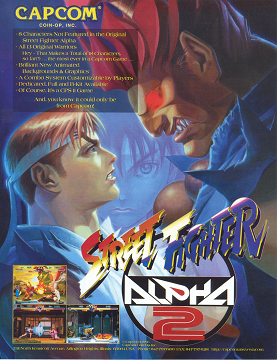
Street Fighter Alpha 2, known as Street Fighter Zero 2 in Japan, Asia, South America, and Oceania, is a 1996 fighting game originally released for the CPS II arcade hardware by Capcom. The game is a remake to the previous year's Street Fighter Alpha: Warriors' Dreams. The game features a number of improvements over the original, such as new attacks, stages, endings, and gameplay features. It was followed by Street Fighter Alpha 3.

Shigesato Itoi is a Japanese copywriter, essayist, lyricist, game designer, and actor. Itoi is the editor-in-chief of his website and company Hobo Nikkan Itoi Shinbun. He is best known outside Japan for his work on Nintendo's Mother/EarthBound series of games, as well as his self-titled bass fishing video game.

Ridge Racer Revolution is a racing video game developed and published by Namco for the PlayStation in 1995. It is the sequel to the PlayStation version of Ridge Racer. Like the original Ridge Racer, the player races computer-controlled cars with the objective of winning a series of races, and supports Namco's NeGcon controller. Ridge Racer Revolution adds two hidden cars, and two-player support via the PlayStation Link cable, and took roughly the same time to develop as the first. The intention was to increase the depth and add features.

Ridge Racer is a 1993 racing video game developed and published by Namco. It was released initially on the Namco System 22 arcade system board and ported to the PlayStation console in 1994. It is the first title in the Ridge Racer series released for arcades and home consoles.

There have been numerous Monopoly video games based on the core game mechanics of Parker Brothers and Hasbro's board game Monopoly. They have been developed by numerous teams and released on multiple platforms over 35+ years.
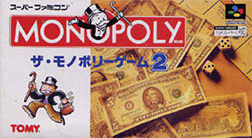
The Monopoly Game 2 is a 1995 video game for the Super Famicom, developed by Tomcat System, and jointly published by Tomy and Ape. It was not released outside of Japan.

Clock Tower, known in Japan as Clock Tower 2, is a survival horror point-and-click adventure game developed by Human Entertainment and released for the PlayStation in 1996. It is the second game in the Clock Tower series after the original Clock Tower, which was released exclusively in Japan for the Super Famicom one year prior. The story takes place in Norway and follows a variety of characters as they attempt to survive the return of Scissorman and uncover the mystery of his seemingly immortal state. The scenarios encountered and endings vary widely based upon the player's actions.
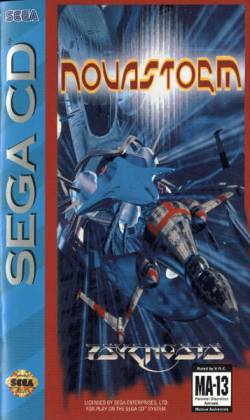
Novastorm is a rail shooter video game developed and published by Psygnosis in 1994. A version for the FM-Towns/Marty systems had previously been released under the name Scavenger 4.
Monopoly Deal is a card game derived from the board-game Monopoly introduced in 2008, produced and sold by Cartamundi under a license from Hasbro. Upon its release, the game was generally well-received for its short playing time and playing interaction.

eBaseball Pro Yakyū Spirits is a Japanese baseball sports simulation game series, developed by Power Pros Production and published by Konami. It is a spin-off series of the Jikkyō Powerful Pro Yakyū franchise.
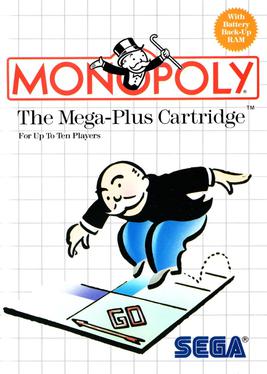
Monopoly is a Master System video game based on the board game Monopoly, released in 1988. Developed by American studio Nexa Corporation and published by Sega, this title was one of many inspired by the property. According to Game Freaks 365, the game was "one of the first real boardgames that was programmed" into a video game.

Monopoly is a video game based on the board game Monopoly, released on Game Boy, Genesis, NES, and SNES. Developed by Sculptured Software and published by Parker Brothers, this title was one of many inspired by the property.
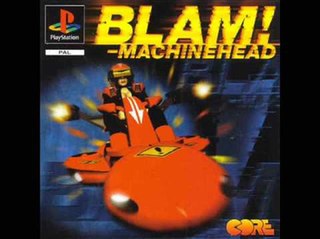
Blam! Machinehead is a first-person shooter developed by Core Design and published by Eidos Interactive in North America and in Japan by Virgin Interactive Entertainment, and was released for Sega Saturn, MS-DOS, and PlayStation in 1996.
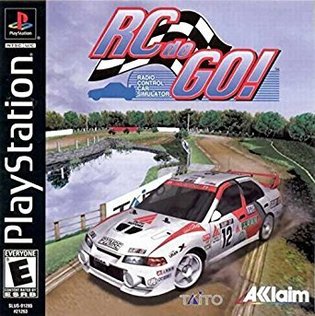
RC de Go! is a racing video game developed by Taito, first released to Japanese arcades in 1999 for Taito's G-NET system. It was later released for the PlayStation, with publishing in North America and PAL territories handled by Acclaim Entertainment.

Hyper 3-D Pinball is a video game developed by British studio NMS Software and published by Virgin Interactive Entertainment for DOS, PlayStation, and Sega Saturn.
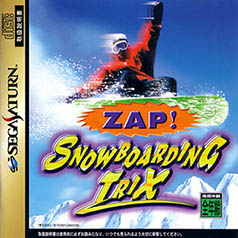
Zap! Snowboarding Trix, sometimes written as Zap: Snowboarding Trix, is a snowboarding video game developed by Atelier Double and published by Pony Canyon. It was released only for the Sega Saturn, and only in Japan. A sequel to the game, called Zap! Snowboarding Trix '98, was later released both for Saturn and PlayStation in 1997–1999, under the title Freestyle Boardin' '99 in North America and Phat Air: Extreme Snowboarding in Europe.
Vitamin is a series of otome games developed by HuneX and published by D3 Publisher for PlayStation 2, Nintendo DS, Nintendo 3DS, PlayStation Portable, and PlayStation Vita. The first title, VitaminX, was released on March 29, 2007 for PlayStation 2.
















